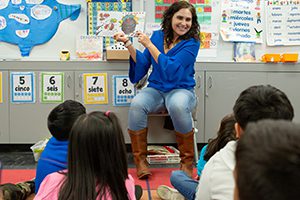Leading the (Federal) Way in AP
In 2010, Federal Way Public Schools in Washington state reversed the paradigm for enrollment in Advanced Placement coursework: Instead of leaving it up to students to decide if they wanted to take advanced courses, the district automatically enrolled students who scored proficient on state assessments and required them to opt out if they wished. Not surprisingly, this policy shift resulted in impressive increases in AP enrollment, particularly among students of color.
But access doesn’t mean success. Federal Way quickly learned that students need more than opportunity; they need the instruction and support that will help them succeed.
That same story is playing out nationally, too. According to the most recent annual report from the College Board, the percent of high school graduates taking AP exams is growing steadily. Specifically, in 2003, 19 percent of graduates took at least one AP test, but by 2013, 33 percent did so. Indeed, getting students into AP classrooms is half the battle, as students can’t possibly pass exams they don’t take. But, the percent of AP exams earning a score of 3 or higher actually declined slightly (from 61 to 57 percent) over the years.
In Federal Way, the influx of students into AP didn’t damage the district’s pass rate, as one might expect with AP expansion. But the pass rate on AP exams didn’t magically improve either; it ticked up a single percentage point from the first to second year of implementation.
In order to ensure that students were benefitting from access to these courses, the district funneled additional resources into instructional coaching for teachers of advanced courses, and principals were responsible for getting teachers on board and problem-solving in their schools. They were often able to reallocate the resources they already had toward the initiative. For example, in order to provide more support to students who were on the cusp of readiness for AP, school leaders relied on AmeriCorps services for additional tutoring. They also supplemented students’ academic skills with AVID programming, a college readiness program designed for students who are academically middling.
“We really are creating a culture of students believing they can do it,” says Principal Liz Drake. “Students who previously had no idea they had a chance of going to college (now) have the chance of a future.”
To learn more about Federal Way’s approach, see the Ed Trust and Equal Opportunity Schools report, Finding America’s Missing AP and IB Students.




